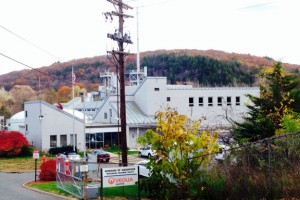Borough working on next step for facility upgrades

NAUGATUCK — Local officials are looking to the state for answers about how to proceed after voters rejected a plan to use a bonding package to pay for the first phase of state-mandated upgrades to the wastewater treatment facility.
The state Department of Energy and Environmental Protection is overseeing an order from the federal Environmental Protection Agency that states municipalities with wastewater treatment facilities must make millions of dollars in upgrades to mitigate environmental pollutants.
On Nov. 4, voters rejected three of four bond packages, including a $12 million plan for incinerator upgrades and pollution abatement projects and installation of a filter to remove mercury from the incinerator output. That failed, 3,394 to 4,039.
Though voters don’t want to foot the bill, the borough has no choice but to comply with the mandates. And if it doesn’t, Naugatuck can face stiff fines and penalties, including shutting down the treatment plant, which is run by Veolia Water North America.
“It’s the law,” said Ron Merancy, chairman of the Naugatuck Water Pollution Control Authority, which oversees the plant. “We have to do it … Unfortunately, the townspeople have no say in the matter. I don’t even know why (local officials) brought it to referendum in the first place.”
Any bonding packages must be brought to referendum, per borough charter, and members of the Board of Mayor and Burgesses didn’t think they should make an exception in this case. Officials did, however, warn taxpayers in advance of the vote that they may be forced to make the upgrades even if the plan was voted down.
Mayor Robert Mezzo and Department of Public Works Director Jim Stewart say they have contacted DEEP officials and told them of the situation. DEEP asked local officials to submit a letter outlining the situation.
“I expect we will have to sit down and hash it out,” Stewart said. “At this point, they have given us no indication, though, as to how we proceed.”
Most municipalities in the state, including Torrington and Derby, approved funding through questions on the ballot Nov. 4. Torrington approved $51 million and Derby approved $31 million for the upgrades.
Stewart said Naugatuck will be behind schedule for upgrades, which are supposed to be completed by 2016. All told, it would cost about $86 million to complete the work in Naugatuck; the borough’s share would be offset by an estimated $10.7 million from Middlebury, which uses Naugatuck’s facility, and an amount to be determined from Oxford, which also taps into the system.
About $30 million of the upgrade is for phosphorous removal. The federal government is making wastewater treatment facilities reduce the amount of phosphorus they emit within the next five years.
Phosphorous is found in fertilizer, some laundry detergents and in dishwashing detergents. Too much phosphorous can trigger algae blooms, reducing the clarity of water. In extreme cases, this can lead to depletion of oxygen and fish kills, according to the DEEP.
On top of the $30 million price for phosphorous removal, Naugatuck must make upgrades to its incinerator for $5 million, repairs to its siphon system for $5 million and miscellaneous upgrades to its entire plant to meet new federal standards at a cost of about $15 million, Stewart said.
About $4 million would go toward sewer rehabilitation, he said. On top of that, there are additional fees of $1.3 million for a facilities plan and $6 million for a design plan, he said. The borough would have to set aside $19 million for contingency.
If Naugatuck shuts down its plant, the borough would lose about $3.4 million a year from contracts it has with outside agencies, including municipalities, to treat their waste, Stewart warned. Plus, it would have to find a way to treat its own waste and would probably be in breach of contract with Veolia, he said.
“So it makes no sense to do that,” he said.
Merancy has long believed that Naugatuck should implement a sewer tax and take out of the budget the amount that Naugatuck pays annually to offset operating costs of the treatment plant, which is about $1 million a year, he said.
For the time being, officials have to figure out a way to get out of the current stalemate.
“I think we need to sit down with citizens and explain the situation thoroughly to them,” Merancy said. “We have to tell them there are two ways to do this — taxes or bonding.”













